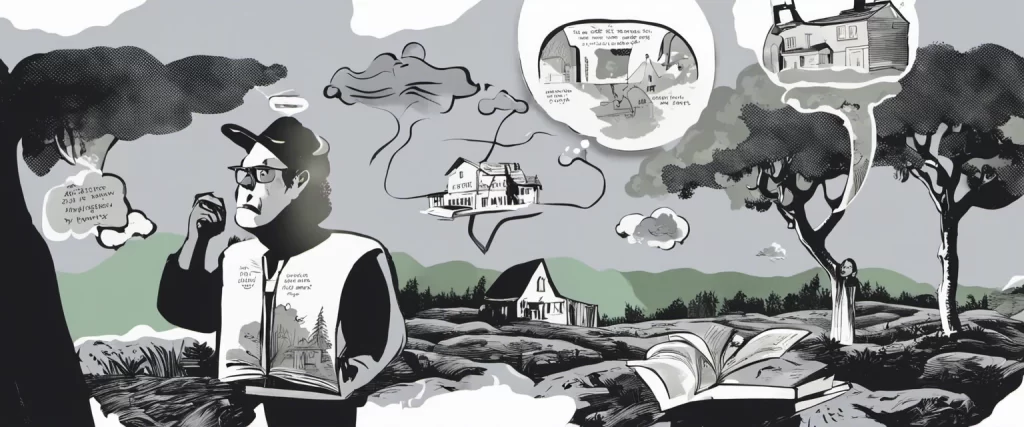—Hillbilly Elegy & Evicted: Poverty and Profit in the American City
In exploring the vast complexities of poverty and its multifaceted impact on American society, two remarkable books shine a piercing spotlight on the lives and struggles of individuals trapped within poverty’s relentless grip. J.D. Vance‘s “Hillbilly Elegy” and Matthew Desmond’s “Evicted: Poverty and Profit in the American City” offer poignant narratives that delve deep into the lives of marginalized communities, highlighting the intertwined issues of economic despair, social dislocation, and the potential for upward mobility. Despite approaching poverty from different angles – one examining the challenges of rural Appalachia and the other shedding light on the urban housing crisis – both authors delicately illuminate the devastating consequences of inequality. As we embark on an interdisciplinary comparative study, this exploration will seek to uncover common threads, key contrasts, and overarching themes present in these two captivating books, ultimately presenting a more comprehensive understanding of poverty’s enduring legacy in contemporary America.
Brief Summary of Two Books
Hillbilly Elegy by J.D. Vance
“Hillbilly Elegy” by J.D. Vance is a memoir that provides a personal account of growing up in a working-class Appalachian family. Vance shares his experiences of poverty, addiction, and violence, while also exploring the social and economic factors that have contributed to the struggles faced by the white working class in America. Through his story, Vance examines the concept of the American Dream, the complexities of family dynamics, and the effects of cultural values on individual outcomes. The book offers insights into the challenges faced by this particular group and presents a thoughtful reflection on the author’s journey towards success and personal growth.
Evicted: Poverty and Profit in the American City by Matthew Desmond
“Evicted: Poverty and Profit in the American City” by Matthew Desmond is an eye-opening account of the housing crisis in America. The book follows the lives of eight families in Milwaukee, Wisconsin, as they struggle to find and keep affordable housing. Desmond brings to light the exploitative and profit-driven nature of the housing market, where landlords take advantage of vulnerable tenants, often leading to evictions. By delving into the lives of both landlords and tenants, the book reveals the interconnectedness of poverty and eviction, illustrating how eviction perpetuates the cycle of poverty. It sheds light on the devastating consequences of eviction on individuals and families, highlighting the emotional and financial toll that it takes. Ultimately, “Evicted” discusses the urgent need for housing reform and offers potential solutions to address the housing crisis in America.
Comparison between Two Books

Similarities in poverty
Both “Hillbilly Elegy” by J.D. Vance and “Evicted: Poverty and Profit in the American City” by Matthew Desmond shed light on the issue of poverty in American society. While approaching the topic from different angles and settings, there are several similarities in the portrayal of poverty in these books:
1. Cycle of intergenerational poverty: Both books emphasize the concept of generational poverty, where individuals grow up in impoverished conditions and are likely to pass down the same circumstances to their children. Vance explores this concept through his Appalachian family’s experiences, while Desmond focuses on the inner-city neighborhoods of Milwaukee. Both authors underscore how growing up in poverty can limit one’s opportunities and create a cycle that is difficult to break.
2. Lack of social mobility: Both works discuss the challenges faced by individuals trying to escape poverty. Vance and Desmond emphasize the limited upward mobility experienced by many impoverished individuals due to factors such as lack of education, limited job opportunities, and a web of economic and social constraints. They illustrate how poverty often becomes a trap that prevents people from improving their lives, irrespective of their individual efforts.
3. Impact on mental and emotional well-being: The books highlight the psychological toll poverty takes on individuals and families. Vance explores the psychological scars left by growing up in a disadvantaged community, which often leads to a sense of hopelessness, self-doubt, and struggles with addiction. Desmond delves into the stress and emotional turbulence experienced by individuals facing eviction and homelessness, which can exacerbate mental health issues and further perpetuate the cycle of poverty.
4. Absence of systemic support: Both authors touch upon the notion that broader societal systems fail to adequately support and uplift those living in poverty. Vance discusses the challenges faced by his rural Appalachian community, where economic decline and cultural factors contribute to a lack of opportunities. Desmond examines the systemic factors that perpetuate poverty in urban environments, such as exploitative landlord practices, discriminatory housing policies, and limited access to social welfare programs.
5. Humanization of the poor: Although both books delve into the systemic issues surrounding poverty, they also humanize the individuals struggling with such circumstances. Both authors emphasize the complex and diverse stories of those living in poverty, providing a nuanced portrait that challenges stereotypes and promotes empathy. They highlight the dignity, resilience, and hopes of those struggling to improve their lives despite harsh circumstances.
In summary, “Hillbilly Elegy” and “Evicted” share similar themes related to poverty, including the generational nature of poverty, limited social mobility, the toll on mental well-being, systemic failures, and the humanization of the impoverished. Both books contribute to a deeper understanding of poverty and the factors that perpetuate its existence in different communities across America.
Divergences in poverty
Hillbilly Elegy by J.D. Vance and Evicted: Poverty and Profit in the American City by Matthew Desmond are both powerful explorations of poverty in different parts of America. While they touch on similar themes, such as the struggles faced by those trapped in poverty, there are divergences in their approach, settings, and focus.
One divergence lies in the geographical settings of the books. Hillbilly Elegy takes place mainly in Appalachian Ohio, focusing on the author’s personal experiences growing up in a working-class family. It delves into the sociocultural factors specific to the region and provides an intimate glimpse into the challenges faced by rural communities. On the other hand, Evicted is set in Milwaukee, Wisconsin, and primarily focuses on the issue of housing insecurity and eviction in urban areas. By contrasting these settings, the books shed light on the diverse nature of poverty and its consequences in different parts of America.
Moreover, the authors’ approaches and emphasis in the books differ. Hillbilly Elegy, while discussing poverty, also places significant emphasis on the impact of family dynamics, cultural values, and the choices individuals make. Vance scrutinizes the role of personal responsibility and resilience, reflecting on his own journey and the influences that shaped his life. On the other hand, Evicted centers its narrative on the systemic factors contributing to poverty, primarily the exploitative rental market and the lack of affordable housing. Desmond examines how individuals caught in the cycle of poverty often become victims of unfair eviction practices, amplifying the inequality and injustice they face.
Another notable divergence is the scope of the books. Hillbilly Elegy offers a more personal and individual perspective on poverty, showcasing how Vance overcame the odds and found success. It offers a nuanced exploration of the cultural and psychological dimensions of poverty. In contrast, Evicted adopts a broader scope, highlighting the structural issues perpetuating poverty and the collective experiences of various individuals facing eviction. Desmond’s work is deeply rooted in meticulous research, providing a in-depth analysis of the social and economic forces that entrench poverty.
Despite these divergences, both books contribute to the understanding of poverty in America. Hillbilly Elegy provides a personal and introspective lens, examining poverty through the author’s own journey. Meanwhile, Evicted illuminates the systemic issues affecting impoverished individuals and communities, aiming to provoke systemic change.
In essence, these two books offer distinct perspectives on poverty in America, showcasing different personal experiences and examining poverty from varying angles. While Hillbilly Elegy focuses on the Appalachian region and personal responsibility, Evicted delves into the urban setting of Milwaukee and the systemic barriers that perpetuate poverty. Together, they paint a broader picture of the complex and multifaceted nature of poverty in America.

Conclusion
Both Hillbilly Elegy by J.D. Vance and Evicted: Poverty and Profit in the American City by Matthew Desmond are highly regarded books that shed light on different aspects of poverty and its impact on individuals and communities. They offer very different perspectives, making it challenging to definitively determine which one is more worthy of reading. Here’s a brief overview of each book to help you make an informed decision:
1. Hillbilly Elegy: This memoir by J.D. Vance explores Vance’s personal journey from a poor, working-class background in the Appalachian region of the United States to achieving success in law school and the corporate world. It provides a reflective and insightful examination of the challenges faced by the white working class and explores topics like economic decline, addiction, and cultural dynamics. Hillbilly Elegy offers a nuanced perspective on societal issues and has sparked significant debates, making it a worthwhile read for understanding the struggles of a particular demographic.
2. Evicted: Poverty and Profit in the American City: Matthew Desmond’s non-fiction book delves into the devastating impact of eviction on low-income families in Milwaukee, Wisconsin. Through extensive research and interviews, Desmond exposes the vicious cycle of poverty and how housing insecurity perpetuates it. Evicted highlights the lives of individuals struggling with limited resources and paints a broader picture of larger systemic issues related to poverty and housing discrimination. This book is highly praised for its empathetic storytelling and its ability to bring to light the complexities of poverty and eviction.
Both books offer valuable insights and foster empathy towards marginalized communities. Therefore, instead of pitting one against the other, it may be more beneficial to read both, as they tackle different facets of poverty in America.



